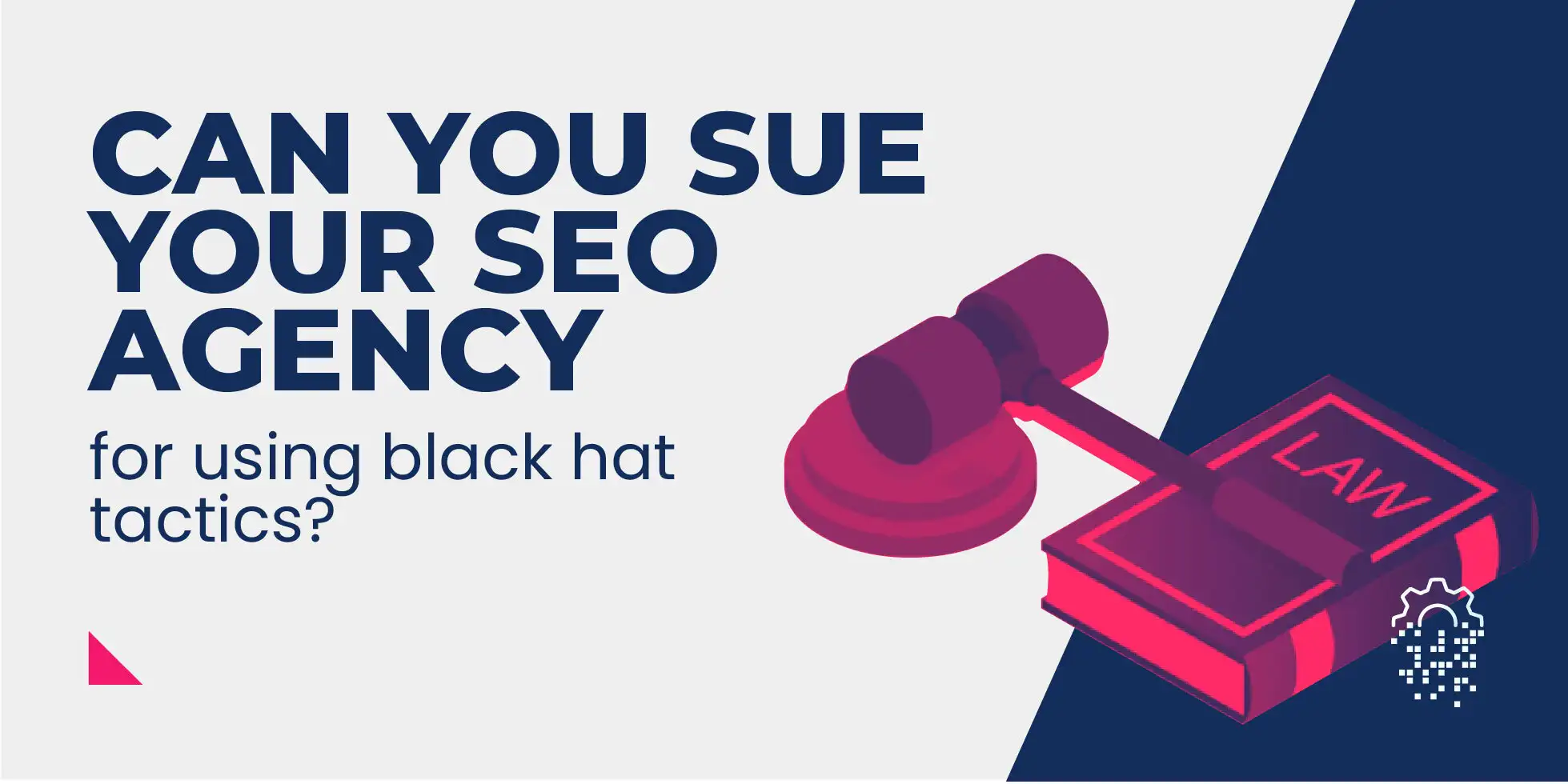
Can You Sue Your SEO Agency For Using Black Hat Tactics?
Just as there are many compelling benefits of SEO done properly, there are also many ways in which your business can take a hit if your SEO is managed negligently, or lazily. The impact of your business using black hat SEO strategies is potentially huge, particularly where your business’ success is reliant on online visibility, since the hefty penalties dished out by Google can set you back significantly and allow competitors to relish in your loss.
Consider, for example, that your business is productive and growing since you rank first on Google for your product’s keyword, meaning that you accept and fulfil thousands of orders each and every day. You have invested in a strong team and set of technology to meet this demand, and more. However, you then notice that your Google rank position has suddenly plummeted, leading to calls tailing off, a large reduction in sales and then a difficult decision to let your staff go later down the line. Sadly, this is not an exceptional case, and we have had plenty of prospective clients sharing their own horror stories with us of how an agency they previously worked with used black hat SEO tactics, without their knowledge and ran their business into the gutter.
It’s unprofessional, deeply damaging and can cost your business both its reputation and finances. But what now?
CONTENTS:1. Is Black Hat SEO Illegal?
2. The Potential Avenues Of Legal Redress
- Sue for Breach of Contract
- Sue for Misrepresentation
- Sue for Negligence
3. Why Are Businesses So Reluctant To Sue?
4. Our Advice To Businesses Looking For SEO Services They Can Trust
5. Some Interesting Questions For The Future
Is Black Hat SEO Illegal?
Although black hat SEO tactics are not strictly illegal, they do violate Google’s webmaster guidelines and guidelines laid down privately by other search engines. This means that, whilst no laws are broken by using black hat SEO, if the rules laid out by the search engines are breached, it is possible that you may face punishment. For instance, using black hat SEO leaves many businesses and websites susceptible to large, damaging penalties.
Google is very transparent about their guidelines, taking a strict approach to any website which attempts to manipulate, cheat or dismiss them. For example, they specifically prohibit certain practices and warn that any violation could lead to Google taking manual action against your website. Although these specific guidelines and basic principles prohibit ‘black hat’ practices, this does not mean ‘black hat’ SEO is illegal, since it is regulated by a private body (Google), and not the law.
With that said, it does not necessarily mean that you have no legal recourse available to your business if you have been punished by Google as a result of your SEO agency using black hat tactics. Although the law fails to address SEO, it does provide various legal principles that might apply. In fact, there are a few ways that you could potentially seek legal redress, and potentially even be awarded damages.
The Potential Avenues Of Legal Redress
1) Sue For Breach of Contract
Where your SEO company has misdelivered, or fails to deliver results in the way specified in your contract, you may be able to sue them for breach of contract as a result. However, it is worth noting that it may not be as simple as many anticipate.
 For a start, you need to have a comprehensive, detailed and valid contractual agreement in place with the SEO agency that clearly outlines each party’s expectations and obligations. Also, there should be a written contract, since promises are far easier to prove and enforce when they are written rather than when they are verbal.
For a start, you need to have a comprehensive, detailed and valid contractual agreement in place with the SEO agency that clearly outlines each party’s expectations and obligations. Also, there should be a written contract, since promises are far easier to prove and enforce when they are written rather than when they are verbal.
If you are looking to sue the agency for using black hat tactics (like spammy link creation) rather than white hat ones (like digital PR services), you should have clarified and agreed in explicit terms what practices are deemed acceptable and not within the contract, so as to prove that a breach of contract has occurred.
Where you have failed to clearly outline that you only authorise the agency to use white hat strategies and how these can be defined, you will likely find that your chance of successfully suing for breach of contract is significantly lower. This is why you should draft the contract meticulously and not rush into any agreements without fully understanding them and their implications.
When deciding whether the contract terms have been breached, you can expect lawyers to make an analysis on the following questions:
- What did the written contract say about the service that is being offered, and how it would be delivered?
- What were the specific terms and conditions that were agreed by both parties?
- Are there any ambiguities within the contract that make wriggle room for the SEO agency possible?
- Were the black hat strategies used negligently or intentionally?
- Are there any exclusion clauses contained within the contract that might be relevant?
- What kind of remedies might be adequate or feasible in this case?
If your claim for breach of contract were successful, there are a few remedies available to you. However, some are more desirable whilst others are more achievable.
The Potential Remedies For Breach of Contract
The most simple remedy for a breach of contract is the ability to end that contract. More often than not, a business will opt to terminate their contract with an agency that has breached their duties and caused them financial and reputational damage. Termination of contract is a remedy that enables them to escape this contract for the rest of its duration.
However, the termination of a contract will not repair or remunerate a business for the losses it has suffered, so it is more likely that your business will want to seek damages too. As the most common legal remedy, damages are largely known as a remedy that seeks to put the party that has suffered a loss as a result of a breach of contract in the position they would have been in had the contract been performed. The difficulty with applying this principle of law within the realm of SEO, however, is that existing principles of law are not necessarily equipped to deal with recent, complex and technological services like SEO. 
As most agencies will be aware, it is bad practice to guarantee that specific search ranking positions for keywords will be achieved as a result of an SEO service, since it is virtually impossible to make that guarantee with many competitors and a multitude of ranking factors to consider, some of which are not even publicly known to SEO experts. As a result, it is challenging to measure where the business would have been before the agency’s negligent or lazy practices. In fact, even where a business has been penalised for breaking Google’s guidelines and has fallen down the rankings as a result, applicants might struggle to prove how much of this is actually down to the actions of the agency directly.
Other remedies are also available for breach of contract but might be less relevant in a case like this, such as injunctions that either order a party to stop doing something that they are doing, or compel them to do something (like perform the contract). Given that the benefits of SEO are most apparent over a longer period of time and businesses will likely be reluctant to continue working with the agency, it is more likely that you would opt to set the contract aside instead.
One thing to consider, however, is whether there are any exclusion clauses or limitation clauses. Although law such as the Unfair Contract Terms Act 1977 renders certain exclusion clauses as void on the basis that they are unfair, this tends to cover things like personal injury or death, not negligence and financial or reputational loss. Insofar as an exclusion clause is fair based on things like the parties’ knowledge of the term, bargaining power, wording of the term, and the price of the service being delivered, it may allow the agency to escape liability, so this is worth paying attention to when drafting a contract or looking to sue.
2) Sue For Misrepresentation
Fraudulent Misrepresentation
Another possibility is to attempt to sue the SEO agency for fraudulent misrepresentation - a scenario whereby an untrue statement of fact was made by one party to another party. This untrue statement induces the party to enter into a contract which later results in loss as a result of the misrepresentation.
 Where a false representation is made knowingly or recklessly as to the truth by the agency, therefore causing the client a loss, you may be able to sue for fraudulent misrepresentation. In order to do this, you will need to show that the fraudulent statement induced your entry into the contract and that you would not have done so if the misrepresentation wasn’t made.
Where a false representation is made knowingly or recklessly as to the truth by the agency, therefore causing the client a loss, you may be able to sue for fraudulent misrepresentation. In order to do this, you will need to show that the fraudulent statement induced your entry into the contract and that you would not have done so if the misrepresentation wasn’t made.
For example, this could be the representation that an agency would only use white hat tactics to get you results, and if you knew this was not the case, then you would not have entered the contract with them for their services. However, if you knew that the statement was untrue, or if you only found out about the statement after entering the contract, it cannot have induced you to enter the contract, so you cannot sue for fraudulent misrepresentation.
Negligent Misrepresentation
There is also the possibility that you can sue where your SEO agency has been negligent in making a representation to you, despite not doing so intentionally. In this instance, because there is going to naturally be a special relationship between your business as a client and the SEO agency as the service provider, you may be able to argue that where a representation has been made carelessly, a breach of duty could have occurred because the party didn’t take sufficient and reasonable care in ensuring that the representation was accurate. Whilst this is less likely to occur than fraudulent misrepresentations, it is important to consider.
The Potential Remedies For Misrepresentation
One remedy for fraudulent misrepresentation is rescission, which is where a contract is set aside and parties are put back into the position they were in prior to the contract being made. Awarding this remedy would mean looking at how the business was ranking and performing prior to the service and contract.
This can be claimed alongside damages, too, which will be measured similarly to damages for breach of contract. However, this means that it will again be difficult to measure the appropriate damages to award, due to the unpredictable and difficult to measure the nature of SEO results.
3) Sue For Negligence
Interestingly, some commentators have expressed the view that a business could potentially make a claim that their SEO Company was negligent in their handling. Although this claim would exist outside of contract law, it would mean that companies could potentially sue under statutory law instead for ‘professional negligence’.
Whilst this is possible, you would need to demonstrate the following things in order for your claim to succeed:
- That a duty of care exists.
That you were owed a duty of care by the SEO agency, which should not be difficult given that they are undertaking paid work for you, and there is a special relationship.
- That the duty of care was breached.
That they breached that duty of care by failing to act with the reasonable skill and care. Unlike many other cases of negligence where the court has already established what ‘reasonable skill and care’ means within different fields of work, applying this principle to SEO lacks precedent, so it remains unclear how this will be measured. Although Google does issue guidelines, these change regularly so it is difficult to understand when an expert might have fallen short of industry standards, and by how far. Essentially, you will need to prove that they did not act in a way that a reasonably competent professional in the field of SEO usually should, which is an uncertain benchmark.
- That financial loss arose out of this breach of duty.
Proving that any financial loss suffered as a result of the breach of duty is also a difficult task unless the website has been issued with a manual penalty and flagged by Google since this will confirm that the practice was a contributing factor at least. However, more nuanced algorithmic damage can be almost impossible to identify and prove, since algorithms tend to lack transparency and can change frequently. As a result, there is no guarantee as to how your business would have ranked but for the breach, or how this might have affected your revenue.
Why Are Businesses So Reluctant To Sue?
Even where businesses know that they have been wronged by their SEO agency, they still tend to be reluctant to seek legal redress. The main reasons for this reluctance were as follows: 
-
Given the lack of publicised cases of success, many businesses are deterred from attempting to sue due to the costs involved and the uncertainty of success
-
Expert legal advice is almost always necessary in cases like these unless you benefit from having expertise in house. This means that seeking redress can prove costly, particularly for smaller start-up businesses.
-
For the ordinary person, it is difficult to distinguish between white hat, grey hat and black hat SEO, but even more difficult to identify specific strategies being used. Therefore, knowing when you have a claim can be impossible.
-
A lack of guidance available online.
-
The fear of reputational damage may put many businesses off, leaving them keen to brush any harmful practices under the carpet rather than publicise it.
Our Advice To Businesses Looking For SEO Services They Can Trust
Having discovered how complex this area of law is and how unpredictable an attempt to sue can be, we believe that prevention is a far better than cure. Therefore, we have devised some specific advice for businesses looking to find an SEO agency that they can rely on for honest, compliant and trustworthy results:
1. Make your contract detailed and reliable
Be sure to sufficiently defend yourself in your contract. In fact, we would go as far as to say that hiring a lawyer to help you draft and negotiate a contract is a good idea. You want to write all of your expectations clearly in writing, specifying which practices you do and do not want to be used and to what extent. Not only will this mean that you are more likely to have a claim in contract law, but it is also a good indication of a sketchy firm if they are reluctant to agree to certain terms.
2. Remember that rank positions are not guaranteed
One thing we would be mindful of, however, is that an SEO Company can never promise you certain, specific positions in the Google rank for certain keywords since this is impossible to measure, ascertain and can change over time.
3. Be clear about your expectations
Be sure to make clear that prohibited practices are material to you and that you are entering the contract based solely on this assurance.
4. Conduct regular audits
We recommend making regular audits of the work done by your SEO agency, not infrequent and one-off ones. Instead, become comfortable auditing the practices that they use and the results returned. The benefit of noticing any potential harm or damage early could mean that it can be more easily repaired, and prevent future harm to your ranking or reputation.
5. Involve a lawyer (if necessary!)
Consult with a lawyer about liquid damages and a damage limit. This is important since some limitation and exclusion clauses may mean that even in the event of a successful claim, your recourse and financial enumeration is limited.
6. Choose a reputable SEO agency
Choosing a reputable SEO agency is no mean feat. A good indication of how well an agency will manage your SEO efforts can often be derived from how well they manage their existing clients. You should look to the reviews, testimonials, case studies and results achieved by an agency before pursuing them. Also, think about the questions a good SEO agency will ask you as well.
Some Interesting Questions For The Future
-
 Will SEO firms that go outside the boundaries of established ‘white hat’ SEO practice therefore be liable for negligence? This will depend on how the courts construe the ‘reasonable care and skill’ of SEO experts to look.
Will SEO firms that go outside the boundaries of established ‘white hat’ SEO practice therefore be liable for negligence? This will depend on how the courts construe the ‘reasonable care and skill’ of SEO experts to look. -
Where a business has failed to do sufficient due diligence on an agency, or failed to engage properly with the contract terms, will the court limit liability? For example, should we expect businesses to investigate the firm first?
-
How can we measure damages where a ranking penalty has occurred but the algorithms are not transparent? For example, how can we possibly measure the lost revenue?
Please note that this article is not to be treated as legal advice, but merely as an insight into the topic.
You may also like to read:
- Legality of Negative Reviews - An Internet Lawyer's View
- The Legality of Negative SEO
- Is Your Digital PR Campaign Going to Get You in Legal Trouble?
